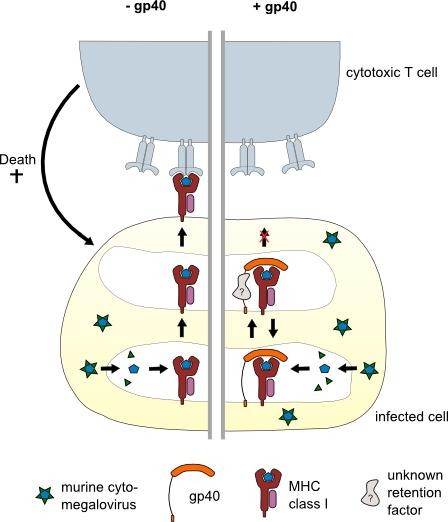How a virus hides from the immune system

Major histocompatibility complex (MHC) class I molecules play a pivotal role in the immune defense against intracellular parasites, such as viruses. Inside the cell, they selectively bind small pieces of the virus that are generated during infection and transport them to the cell surface to display the infection to the immune system, a process called antigen presentation.
Specialized immune cells, the cytotoxic T lymphocytes (CTL), can recognize those viral pieces and, in turn, kill the infected cell in order to fight the infection (see left part of figure).
It is not astonishing that many viruses aim to interfere with antigen presentation by MHC class I molecules to circumvent elimination. Herpesviruses are masters of immunoevasion and possess a series of multiple interfering proteins, the immunoevasins:
The gp40 protein of mCMV inhibits the transport of MHC class I molecules to the cell surface and thus viral recognition by CTL. Instead, MHC class I molecules are retained inside the cell (see right part of figure).
“We have shown for the first time that gp40 binds to MHC class I molecules”, says Professor Springer. “We do not yet know how gp40 itself is kept inside the cell, but we believe that it uses another protein as some sort of anchor.” The researchers identified a region in the gp40 protein, the linker, which probably binds to this unknown cellular retention factor (see right part of figure).
“It is an amazingly effective strategy for a virus to escape from the immune response”, concludes Professor Springer. “Cytomegaloviruses and other herpesviruses infect humans and animals and cause many diseases. We need to understand more about immune escape so that effective treatments can be designed.”
The findings will soon be published in the “Journal of Cell Science”. Linda Janßen, Venkat Raman Ramnarayan, Mohamed Aboelmagd, Maria Iliopoulou, Zeynep Hein, Irina Majoul, Susanne Fritzsche, Anne Halenius, and Sebastian Springer: “The murine cytomegalovirus immunoevasin gp40 binds MHC class I molecules to retain them in the early secretory pathway”, Journal of Cell Science, 2015. The study was financed in part by the Tönjes Vagt Foundation of Bremen.
Contact:
Sebastian Springer | Professor of Biochemistry and Cell Biology
s.springer@jacobs-university.de | Tel.: +49 421 200- 3243
About Jacobs University:
Jacobs University is a private, independent, English-language university in Bremen. Young people from all over the world study there on Bachelor’s, Master’s and PhD courses. Jacobs University is international and trans-discipline: research and teaching do not pursue one single pathway, but instead approach issues from the viewpoints of different disciplines. This is what makes Jacobs’ graduates highly sought-after for employment in successful international careers.
Media Contact
All latest news from the category: Life Sciences and Chemistry
Articles and reports from the Life Sciences and chemistry area deal with applied and basic research into modern biology, chemistry and human medicine.
Valuable information can be found on a range of life sciences fields including bacteriology, biochemistry, bionics, bioinformatics, biophysics, biotechnology, genetics, geobotany, human biology, marine biology, microbiology, molecular biology, cellular biology, zoology, bioinorganic chemistry, microchemistry and environmental chemistry.
Newest articles

Machine learning algorithm reveals long-theorized glass phase in crystal
Scientists have found evidence of an elusive, glassy phase of matter that emerges when a crystal’s perfect internal pattern is disrupted. X-ray technology and machine learning converge to shed light…

Mapping plant functional diversity from space
HKU ecologists revolutionize ecosystem monitoring with novel field-satellite integration. An international team of researchers, led by Professor Jin WU from the School of Biological Sciences at The University of Hong…

Inverters with constant full load capability
…enable an increase in the performance of electric drives. Overheating components significantly limit the performance of drivetrains in electric vehicles. Inverters in particular are subject to a high thermal load,…





















